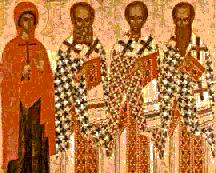 The
language comes into existence usually if it gains a national state. The
Russian language rose from various East Slavic tribal dialects when
in the 9th century Novgorod and Kiev Principalities were united by Prince
Oleg. Since then in Kiev Russia gradually the joint form of language began
to develop. Old Russian is a source of rich literature written in Kiev
Russia in the 10th - 13th centuries, until the Mongol conquest. These sources
are represented by "Pravda", the Codes of Laws in the Principality, and
various poetry including "The Lay of Igor's Host".
The
language comes into existence usually if it gains a national state. The
Russian language rose from various East Slavic tribal dialects when
in the 9th century Novgorod and Kiev Principalities were united by Prince
Oleg. Since then in Kiev Russia gradually the joint form of language began
to develop. Old Russian is a source of rich literature written in Kiev
Russia in the 10th - 13th centuries, until the Mongol conquest. These sources
are represented by "Pravda", the Codes of Laws in the Principality, and
various poetry including "The Lay of Igor's Host".
Many people mix Old Russian with Old Church Slavic, the language which was used for translating the Bible and other Christian books into Slavic. But the first is East Slavic, while Church Slavic, widely used even nowadays in churches of Russia and other Orthodox countries, is South Slavic by nature. Writing in Russia began at the end of the 10th century after the conversion of the Slavic peoples in the area to Christianity. At the time of its introduction, Old Church Slavic was readily understood by Eastern Slavs. Gradually, however, the difference between the written and the spoken language increased, the spoken language undergoing a number of simplifications in both its phonemic (sound) and morphological (word-forming) structure.
E.g., Old Russian lost absolutely all words beginning in a, except later borrowings and some interjections. These words got a j in the beginning. The number of declension types and noun stems was reduced and mixed greatly. Adjectives which were used in their short form in Church Slavic and Common Slavic, began to be used in their pronominal form only. The verb system was simplified considerably, losing some tenses (like Slavic aorist, perfect and plusquamperfect), and since then Old Russian formed the past tense by using the Common Slavic participle in -l (jaz delal - I was doing). The auxiliary verb in subjunctive mood was no longer conjugated, becoming just a particle (jaz by delal - I would be doing).
In the 13th and 14th centuries, after Kiev Russia was divided into Mongol and Polish regions, Old Russian started its evolution, turning gradually into three separate tongues: Ukrainian, Belorussian and Russian.